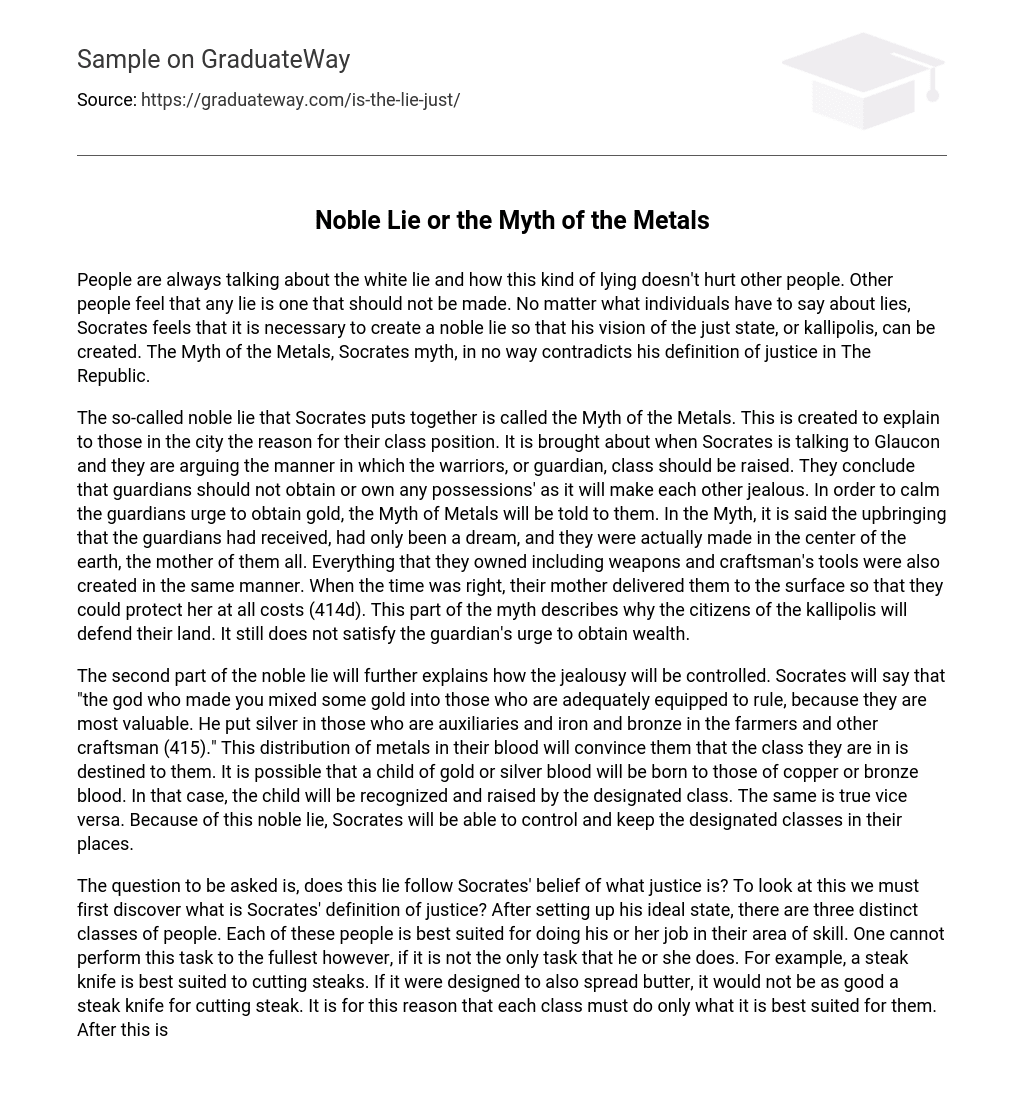There is constant discussion about the concept of a white lie and its perceived lack of harm towards others. However, some believe that any form of deception should be avoided. Regardless of varying opinions on the matter, Socrates argues that it is essential to fabricate a noble lie in order to establish his vision of a just state called kallipolis. Socrates’ fable, known as the Myth of the Metals, aligns perfectly with his definition of justice as outlined in The Republic.
Socrates creates the so-called noble lie known as the Myth of the Metals to explain the class positions in the city. During a conversation with Glaucon, they discuss the upbringing of the warrior class and agree that guardians should not possess any belongings to prevent jealousy. To curb their desire for gold, the Myth of Metals is introduced. According to this myth, the guardians were not actually raised as they remember but were born in the center of the earth. Their mother, the earth itself, also created all their possessions including weapons and tools. Eventually, they were brought to the surface to protect their motherland at all costs (414d). This part of the myth clarifies why the citizens of kallipolis would defend their land. However, it doesn’t completely satisfy the guardian’s desire for wealth.
The second part of the noble lie explains how jealousy will be controlled. According to Socrates, the god who created humans infused gold into those fit for ruling, as they are the most valuable. Those in the auxiliary roles were given silver, while farmers and other craftsmen received iron and bronze (415). This distribution of metals in their blood convinces individuals that their social class is predetermined. It is possible for a child with gold or silver blood to be born into a family of copper or bronze blood. In such cases, the child would be recognized and raised by their designated class. The same applies vice versa. Through this noble lie, Socrates can maintain control over the designated classes.
The question that needs to be asked is whether this lie conforms to Socrates’ idea of justice. We must first understand Socrates’ conception of justice, which consists of three distinct classes in his ideal state. Each class is meant to perform their respective tasks according to their skills. A task cannot be performed to its fullest potential if it is not the only task one does. For example, a steak knife is most effective at cutting steaks and would not be as good at spreading butter if designed for both purposes. Hence, each class must solely focus on what they are best suited for. Socrates and Glaucon then discuss the upbringing of rulers and guardians, although these details are not relevant to the argument about justice. Socrates believes that civic justice entails every class performing their respective tasks based on their abilities, which has been evident from the beginning but overlooked until now (432d).
Until now, Glaucon and Socrates have solely explored the concept of justice within the state. However, they now seek to understand justice within the soul. Socrates believes that in order to do this, it is vital to identify three traits of society and then compare them to the human soul. These three traits—appetite, spirit, and rationality—correspond to the three social classes of producers, guardians, and rulers, respectively. They argue that the human soul is also comprised of these three traits. Since both the kallipolis (the just city) and the human soul possess these three attributes, it can be affirmed that justice in the city is connected to justice in the human soul. Within the city, justice is defined as each class performing its designated tasks proficiently. In this same manner, justice within the human soul requires each part of the mind to fulfill its appropriate role without interfering with the other aspects.
Now we can address the question at hand: Does the reliance on lying contradict Socrates’ concept of justice? The Myth of Metals demonstrates that it does not contradict Socrates’ understanding of justice. Justice, according to Socrates, involves separating the different components of the human mind and allowing each part to perform its most suitable function. The Myth of Metals complements this definition as it reveals that the rational part of the brain is functioning appropriately to establish a just society. This notion is supported earlier in the text by the example of a musician – a good musician cannot make someone less skilled through teaching. Similarly, a musical individual cannot create non-musical music that is pleasing to the ear. Applying this logic to the myth, it becomes clear that a lie intended to bring about justice cannot be considered unjust.
In order to ensure justice in the kallipolis, Socrates developed the Myth of the Metals, which would effectively prevent the different social classes from mixing and keep everyone content with their assigned place in society. However, upon further reflection, Socrates realizes that true justice extends beyond the societal realm and also applies to individuals. Despite this shift in understanding, it is evident that the Myth of the Metals does not contradict Socrates’ definition of justice as presented in The Republic.
Here is the bibliography:





